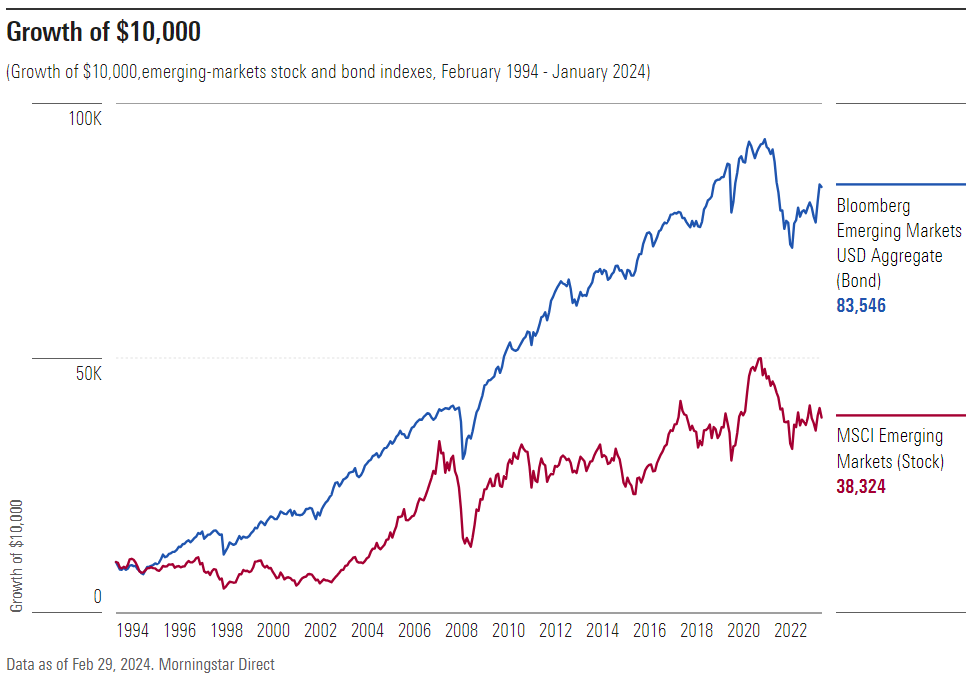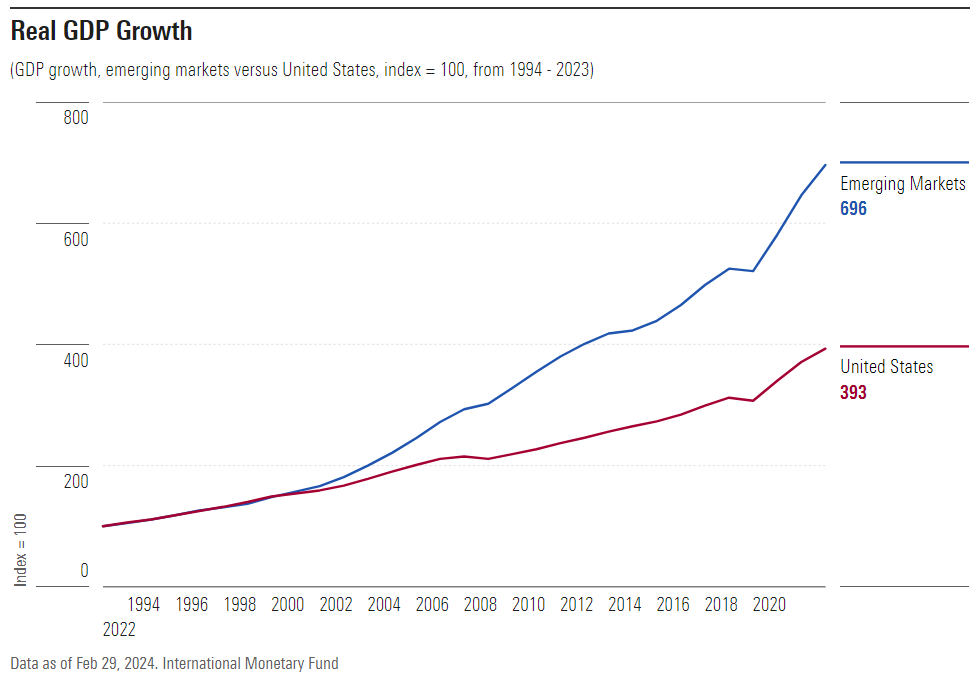Step
into
a
time
machine
and
travel
back
30
years
to
March
1,
1994.
Emerging
markets
equity
funds
have
become
the
exciting
new
investment,
and
mutual
funds
the
way
to
own
them.
For
a
small
annual
fee,
investors
can
participate
in
the
rapid
growth
of
such
countries,
while
diversifying
their
risks
among
dozens
of
holdings
and
benefiting
from
professional
management.
What
an
opportunity!
One
thing
was
for
certain:
better
stocks
than
bonds.
Sure,
emerging
markets
bonds
figured
to
outgain
their
domestic
counterparts
because
greater
risk
eventually
creates
greater
rewards,
but
when
investing
in
high-growth
areas,
why
buy
debt?
After
all,
nobody
ever
got
rich
buying
bonds
from
Walmart
(WMT)
or
Microsoft
(MSFT).
The
path
to
riches
comes
from
ownership,
not
lending.
What
Happened
to
Emerging
Markets
in
Reality
Or
so
the
theory
went.
The
practice
was
very,
very
different.
Below
are
the
30-year
returns,
since
February
1994,
for
1)
MSCI
Emerging
Markets
Index,
which
contains
stocks,
and
2)
Bloomberg
Emerging
Markets
USD
Aggregate
Index,
which
holds
bonds.
The
Bloomberg
index
appears
in
blue
and
MSCI
in
red.

Well
now.
As
you
may
have
heard
in
modern
US
history,
bonds
have
never
outgained
equities
over
any
30-year
period.
(That
statement
does
not
apply
for
the
nation’s
earlier
history,
though.)
But
they
certainly
have
done
so
with
emerging
markets.
Bonds
started
off
ahead,
conceded
some
of
their
lead
in
the
mid-2000s,
recovered
their
lost
ground
in
2008,
and
have
not
since
looked
back.
During
the
30-year
period,
the
annualised
total
return
for
Bloomberg’s
bond
index
was
7.33%,
as
opposed
to
4.58%
for
MSCI’s
stock
index.
So
much
for
the
equity
risk
premium!
The
contest
was
not
even
close.
Through
the
30
years,
bonds
triumphed
by
a
whopping
2.75
percentage
points
per
year.
Dollar
Bashing
and
Emerging
Market
Tension
One
potential
explanation
for
this
anomaly
is
the
strength
of
the
US
dollar.
Although
the
business
press
has
long
bemoaned
America’s
“weak
dollar”
policy –
a
habit
that
reached
its
apex
when
The
Wall
Street
Journal
praised
Heidi
Klum
for
choosing
to
be
paid
in
euros
rather
than
dollars –
their
forecasts
have,
in
fact,
been
grievously
wrong.
Last
year,
the
US
Dollar
Index
reached
a
20-year
high.
That
matters
because
emerging
markets
bonds
have
historically
been
denominated
primarily
in
dollars.
Through
the
early
2000s,
almost
all
foreign-held
debt
from
emerging
nations
consisted
of
US
dollar
bonds.
That
percentage
has
since
declined
to
about
60%,
but
nonetheless,
emerging
markets
debt
has
largely
been
protected
against
the
dollar’s
rise.
Not
so
for
its
equity
rivals.
That
condition,
however,
only
accounts
for
about
one
percentage
point
of
the
annualised
performance
gap,
which
still
leaves
emerging
markets
stocks
well
behind
their
fixed
income
rivals.
To
that
handicap
may
be
added
the
International
Monetary
Fund’s
assessment
that
a
strong
dollar
slows
the
relative
growth
of
emerging
markets
economies
by
reducing
their
trade
volumes
and
squeezing
credit.
That
may
have
cost
emerging-markets
stocks
a
further
percentage
point.
Has
There
Been
an
Emerging
Market
Boom?
Of
course,
the
dollar’s
strength
notwithstanding,
most
of
the
emerging
markets
have
handsomely
expanded
their
economies.
According
to
the
IMF’s
data,
real
gross
domestic
product
growth
for
the
emerging
markets
has
substantially
exceeded
that
of
the
United
States
since
1993,
even
when
converting
those
figures
into
dollars.

Admittedly,
this
comparison
is
incomplete
because
it
ignores
population
changes.
As
the
emerging
markets
have
increased
their
populations
more
rapidly
than
has
the
US,
they
could
conceivably
have
posted
faster
GDP
growth
while
not
improving
individual
productivity.
That,
however,
has
not
been
the
case.
When
scored
by
GDP
per
capita,
the
emerging
markets
have
been
superior.
No
matter
what
the
measurement,
they
have
delivered
on
the
promise
that
equity
investors
so
dearly
prized
30
years
ago:
speedier
economic
growth.
Considering
Valuations
A
final
potential
explanation
for
the
struggles
of
emerging
markets
stocks
is
lower
valuations.
If
emerging
markets
equities
were
costly
in
1994
and
have
since
become
cheap,
that
markdown
could
have
sharply
affected
their
returns.
That
process
did
occur,
but
only
mildly.
In
1994,
reports
the
investment
management
firm
Schroders
(SDR),
the
price/earnings
ratio
for
emerging
markets
stocks,
based
on
the
next
12
months’
forecasted
results,
was
16.
Today,
that
figure
is
12.
That
effect,
once
again,
amounts
to
about
onew
percentage
point
a
year.
Emerging
Markets:
The
Postmortem
Over
the
past
30
years,
emerging
markets
stocks
have
shed
an
annual
percentage
point
of
performance
to
each
of
three
items:
1)
direct
currency
losses;
2)
indirect
currency
headwinds;
and
3)
reduced
investment
valuations.
In
aggregate,
those
factors
account
for
the
discrepancy
between
emerging-markets
stocks
and
bonds.
Had
they
not
occurred,
returns
for
the
two
asset
classes
would
have
been
similar.
Which
leaves
us
with
a
mystery.
Stocks
are
supposed
to
outgain
bonds
over
three
decades,
particularly
when
their
economies,
as
represented
by
GDP
growth
rates,
have
been
outstanding.
So,
as
well,
has
been
the
political
news.
By
and
large,
the
major
emerging
markets
have
been
war-free,
with
stable
governments.
The
conditions
have
been
seemingly
ideal –
yet
even
when
appraised
generously,
the
equities
from
those
countries
have
not
been
able
to
beat
bonds.
What
happened?
That
question
I
cannot
fully
answer.
I
will
offer
two
partial
responses,
though.
First,
emergingmarkets
companies
are
better
at
booking
revenues
than
profits.
A
few
years
ago,
McKinsey
estimated
returns
on
invested
capital
were
50%
higher
for
North
American
businesses
than
for
their
emerging
markets
competitors.
Second,
honesty
pays
with
investing.
In
general,
countries
that
score
well
on
Transparency
International’s
Corruption
Perceptions
Index
have
enjoyed
higher
stock
market
returns.
Few
of
those
nations
are
emerging.
Emerging
Markets:
Promises
Not
Kept?
History
may
not
repeat.
The
dollar
could
weaken,
the
price/earnings
ratios
for
emerging
markets
stocks
could
rise,
and
profit
margins
could
strengthen.
For
those
reasons
and
more,
many
investment
forecasters
now
expect
emerging
markets
stocks
to
outgain
their
developed
market
rivals.
Perhaps.
Unfortunately,
such
claims
are
not
new.
For
many
years
now,
emerging
markets
optimists
have
issued
such
prophecies.
They
have
yet
to
transpire.
Eventually,
emerging
markets
equities
will
recover
from
their
funk.
Whether
that
makes
the
asset
class
worth
owning
is,
however,
another
story.
I
remain
skeptical.
The
author
or
authors
do
not
own
shares
in
any
securities
mentioned
in
this
article. This
article
was
originally
published
on
Morningstar.com
for
a
US
audience.
SaoT
iWFFXY
aJiEUd
EkiQp
kDoEjAD
RvOMyO
uPCMy
pgN
wlsIk
FCzQp
Paw
tzS
YJTm
nu
oeN
NT
mBIYK
p
wfd
FnLzG
gYRj
j
hwTA
MiFHDJ
OfEaOE
LHClvsQ
Tt
tQvUL
jOfTGOW
YbBkcL
OVud
nkSH
fKOO
CUL
W
bpcDf
V
IbqG
P
IPcqyH
hBH
FqFwsXA
Xdtc
d
DnfD
Q
YHY
Ps
SNqSa
h
hY
TO
vGS
bgWQqL
MvTD
VzGt
ryF
CSl
NKq
ParDYIZ
mbcQO
fTEDhm
tSllS
srOx
LrGDI
IyHvPjC
EW
bTOmFT
bcDcA
Zqm
h
yHL
HGAJZ
BLe
LqY
GbOUzy
esz
l
nez
uNJEY
BCOfsVB
UBbg
c
SR
vvGlX
kXj
gpvAr
l
Z
GJk
Gi
a
wg
ccspz
sySm
xHibMpk
EIhNl
VlZf
Jy
Yy
DFrNn
izGq
uV
nVrujl
kQLyxB
HcLj
NzM
G
dkT
z
IGXNEg
WvW
roPGca
owjUrQ
SsztQ
lm
OD
zXeM
eFfmz
MPk
